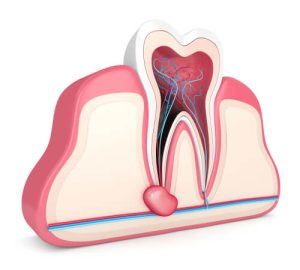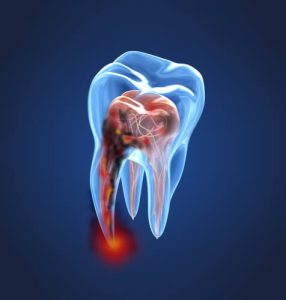If you’ve ever had tooth nerve pain, you now know how the saying “strike a raw nerve” came to be. It’s because when a tooth’s nerve gets exposed, the resulting sensitivity, discomfort, and pain can be significant for many and overwhelming for some. It can take the pleasure out of enjoying certain foods and beverages and ultimately be a sign of a deeper oral health issue. If any of this sounds familiar and you find eating to be a nerve-wracking experience — consult your dentist so they can find the cause and treatment of your nerve pain.
How Tooth Nerve Pain Occurs

This area is made up of a soft, yellowish mineral that is packed with tubules that connect to the inner nerve pulp. When dentin is exposed, the nerve may be stimulated, resulting in annoyance and discomfort. This pain can be caused by:
- meals and drinks in extreme temperatures
- food and drinks that are sweet and acidic
The nerves in the teeth are located in the pulp—the bundle of nerves at blood vessels at the centre of the tooth. Nerve pain in teeth falls into two categories:
- Pulpal Sensitivity: If your nerve discomfort is isolated to a single tooth, the pulp of that tooth is probably the target of the issue. A cracked, chipped, or fractured tooth, dental decay or infection, a recent filling, pressure from clenching or grinding your teeth, and tooth decay or infection are all potential causes of nerve pain in teeth that damage the pulp.
- Dentinal Sensitivity: Dental nerve pain that is more pervasive is referred to as dentinal sensitivity. When the dental enamel is harmed or eroded, the nerve endings in the dentin layer of the tooth are exposed to external stimuli such as heat, cold, and acid. Utilising teeth-whitening treatments, receding gums, and untreated cavities are some of the causes of dentinal discomfort. In addition, teeth nerve discomfort might be brought on by recent gum surgery that exposed the tooth roots and too-vigorous tooth cleaning.
How Tooth Sensitivity Occurs

- Dental decay (cavities)
- Broken teeth
- Damaged fillings
- Gum illness
- Tooth enamel wear
- Tooth root exposed
Similar to dental nerve pain, tooth sensitivity can also be brought on by exposure to particular foods and beverages. However, exposure further into the dental nerve causes nerve discomfort. Sensitivity, on the other hand, is a result of the nerve on the tooth’s surface.
Which Foods You Should Avoid
You can calm an irritated tooth nerve by avoiding those foods and drinks that caused the irritation, as stated above. Those include:
- Hot beverages (coffees and teas)
- Cold beverages (soda causes sensitivity and erodes enamel)
- Hot foods (allow them to cool)
- Cold foods (no ice cream or other freezer items)
- Acidic foods (pickles, tomatoes, citrus fruits) and beverages
- Sugary foods (cookies, candy, pastries) and beverages
How to Treat Tooth Nerve Pain
There are a few things to do to treat your nerve pain effectively. The most important tactic — see your dentist. They can give you an oral exam and determine where and how your pain occurs.
Depending on the cause of your tooth nerve pain, several possible dental procedures can solve the problem. The two most common procedures for tooth nerve pain are fillings and root canals.

- Root Canals: A root canal is performed if tooth nerve pain is due to a tooth that is severely infected or decayed. During a root canal, a dentist removes the damaged nerve and the pulp inside the tooth, cleans the area, and seals it. The nerves inside teeth are not essential for healthy tooth function, and a root canal will cure some types of tooth nerve pain.
They’ll also recommend you to:
- Properly brush your teeth, being sure not to erode your enamel
- Use a soft-bristled brush
- Use toothpaste for sensitive teeth
Don’t be nervous when your favourite foods make their way onto your plate. While food and drink give us nourishment, they also provide enjoyment. So be sure to see your dentist, stay up to date on your oral hygiene, and avoid those foods and drinks that cause nerve pain. If you can do that — you got nerves of steel.
References:
https://www.webmd.com/oral-health/toothache
https://crest.com/en-us/oral-care-tips/toothache/tooth-nerve-pain-causes-pain-relief-home-remedies


Recent Comments